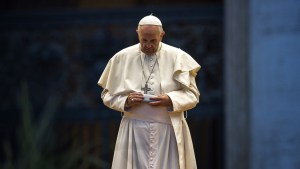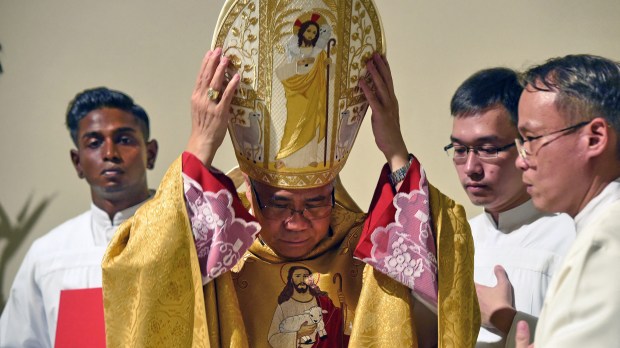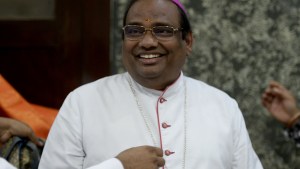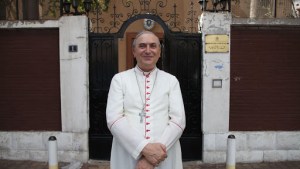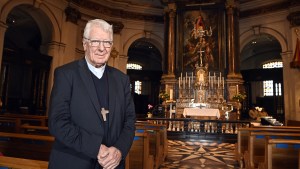Singapore, a tiny island-state at the tip of the Malay Peninsula, first received Catholicism in the 16th century from Portuguese merchants. The first priest of Singapore, who arrived in 1821, was followed in 1839 by Fr. Jean-Marie Beurel, a Breton missionary considered today as the founder of the local Catholic Church.
Two hundred years later, the small Southeast Asian republic will soon have its first cardinal in the person of its current archbishop, William Goh Seng Chye.
William Goh was born in Singapore in 1957 to a practicing Catholic family. He considers that he owes his vocation to his mother’s great fervor, saying he remembers how ardently she prayed her rosary when he was only 4 years old. At only 12 years of age, he prayed the rosary himself every day, maintained a great devotion to the Virgin Mary, and meditated on the Scriptures.

A banker turned priest
His parents enrolled him in a Catholic school on the island, where he joined a Catholic youth movement and then became an altar boy, taking a passion for the liturgy. When he finished high school in 1976, he already had the idea of becoming a priest but still hesitated. After his military service, he chose to work for the British bank Barclays. It was a two-year period that he describes as very joyful and during which his faith and spiritual life continued to grow.
But the call to the priesthood was strong and, despite his father’s opposition, he decided to join the local seminary in Penang, where he was accepted as a candidate for the priesthood.
In 1985, he spent a year in Rome, where he obtained a degree in theology at the Pontifical Urban University, then returned to Singapore, where he was ordained on May 1. He returned to Rome to continue his studies in dogmatic theology at the Pontifical Gregorian University. Upon his return to Singapore, he was entrusted with the roles of teacher and formator at the major seminary, eventually becoming its dean, procurator, and finally director, a position he held until 2013. In 1995, he joined the theological commission of the Commission of Asian Episcopal Conferences.
During these years, he was also spiritual director for the diocesan spirituality center and for several youth and charismatic movements, one of his passions as a pastor. He describes Singapore’s Catholic youth as “vibrant, creative, and energetic,” saying that the Church, in order to grow, must learn to understand their aspirations.
A bishop committed to interfaith dialogue
In 2012, Pope Benedict XVI appointed him coadjutor archbishop of Singapore under Archbishop Nicholas Chia Yeck Joo, who retired the following year at age 75. Archbishop William Goh became the second native Singaporean to head the diocese, which is the only diocese in Singapore. The country is only slightly more than 3.5 times the size of Washington, DC. The total population of the island is about 6 million.
The Singaporean archbishop is very much involved in the culture of interfaith dialogue—a particular focus of the city-state—which promotes harmony between the local Buddhist, Muslim, Taoist, Hindu, Protestant, and Catholic communities. Buddhism represents the largest group on the island, with about 31% of the population. Christians make up about 19% and Muslims another 16%.
Since 2014, Archbishop Goh has been among the city’s official representatives for dialogue between these communities.
The day after his episcopal ordination in 2013, during a meeting in the presence of the main religious representatives of Singapore, he denounced the secularization of the world and the rise of secularism, responsible for the progress of relativism and therefore the fragmentation of societies.
Mobilization against abuses
In Asia, Archbishop Goh has been one of the few prelates to speak out publicly on the issue of abuse. Last May, he apologized to the Catholic community after the conviction of a religious in his diocese who had abused two teenagers, calling for “awareness of the facts.” Under his governance, the diocese’s independent abuse office, which has existed since 2011, came under the leadership of a layman in 2018.
Finally, in the public life of the country, Archbishop Goh—in line with the Catholic Church’s position on this issue—is one of the great defenders of the abolition of the death penalty in Singapore, where the death sentence is still regularly applied, especially in cases of drug trafficking.
